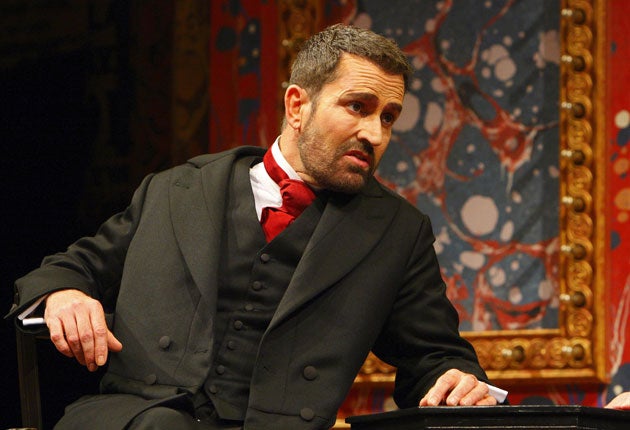David Lister: We need the comedic voice of Edinburgh now more than ever
The Week in Arts

The Edinburgh Festival and Fringe are upon us.
The comedian Dave Gorman, writing in The Independent, said that performers at Edinburgh take on debts that would scare Greece, and maybe that's why they call the city the Athens of the North.
Actually, I've always agreed with the view expressed by a character in a Tom Stoppard play, that it's more the Reykjavik of the South. Certainly, it's the only place where my fingers have gone numb in August.
But its attractions are many, and this year even the studiedly anarchic Fringe has lured some very big names. Hollywood's John Malkovich is there. He's not alone. Simon Callow, Art Malik, Diana Quick, Julian Sands and ex-pop star Marc Almond are all trying their luck on the Fringe.
But if the Fringe is looking decidedly starry, it may be in danger of losing its most prized asset, spontaneity. In a week in which Britain and British society have been rocked, the arts should be reacting to events, exploring them and coming up with answers. Of course, it takes time to commission and write work. At least, it normally does. But what if dramatic, unprecedented and life-changing events take place at a time when thousands of the most energetic, challenging and thoughtful performers are all in one city, not bound by contracts, scripts or conventions? Surely it's a scenario made for art to play a role in events, whether in a theatre, a stand-up venue, a church hall or literally on the street.
But there are no signs yet of student theatre companies staying up all night to write and rehearse a drama reacting to the riots. More surprising is the reluctance of some comedians to engage, even though it is the norm for them to update material to be topical.
The most unpleasant and even terrifying events can be explored through comedy and satire, and there are comics who have remembered that. Andrew Maxwell wrote a new joke for his act: "The person I feel most sorry for is Seb Coe. He must be lying on the floor in the foetal position, worrying that they won't know which gunshot to start the 100m on." OK, it may not be an award winner. But he is at least engaging with events. The fine comedian Josie Long, on the other hand, told one newspaper she had written new material this week but was so distressed by the situation that they were hardly jokes, more a series of heartfelt questions. "To be honest, I feel a bit uncomfortable with being a comedian at this time," she said.
But not uncomfortable being a comedian when it comes to jokes about marriage break-up, or loneliness, or death, or war. No subject is beyond comedy. Artists have to stand outside events and help the rest of us make sense of them. That includes comedians. That includes the Fringe. For all its spirit of jollity, it is the centre of artistic endeavour at the moment.
Rex Harrison's ghost is laid to rest
The West End is awash with fine performances by some of our leading men this week. Jude Law has won praise at the Donmar; James Corden has them rolling in the aisles at the National; Kevin Spacey's Richard III has excited the critics at the Old Vic. But for my money I witnessed the best acting in town when I went along to see Pygmalion at the Garrick and caught Rupert Everett as Professor Henry Higgins.
Pygmalion, of course, was adapted into the musical My Fair Lady and actors playing the part of Higgins in both the play and the musical over the past half-century have found it nigh impossible to get away from the interpretation of Rex Harrison as the suave, condescending Higgins. Everett made him his own man, languid but self-doubting, highly attractive but in many ways deplorable, funny but poignant. In the last scene, watching him desperately trying to understand his own feelings was heart-rending. He leaves the role shortly. I hope someone persuades him to reprise it either on stage or TV.
Just when you really wanted an encore...
The 15 minutes of applause at the end of the Prom by Gustavo Dudamel and the Simon Bolivar Symphony Orchestra was said by some to be a record for the Proms. I was present at their performance of Mahler's second symphony, and it was an emotional experience. But I will confess to a frisson of disappointment that the orchestra didn't do an encore. On their last two visits to London with Dudamel, the Venezuelan youngsters put on their colourful national colours, played a selection from West Side Story and threw their instruments up in the air and caught them. I suppose that such antics wouldn't have sat very well with the devastating and heart-rending effects of Mahler's second.
Nevertheless, I strongly suspect that of those 15 minutes of applause, 12 were in appreciation of what the audience had just seen and heard, and three were a plea for that fondly remembered encore.
d.lister@independent.co.uk
Subscribe to Independent Premium to bookmark this article
Want to bookmark your favourite articles and stories to read or reference later? Start your Independent Premium subscription today.

Join our commenting forum
Join thought-provoking conversations, follow other Independent readers and see their replies